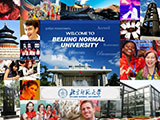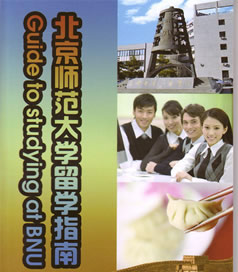Studying in the College of Chinese Language & Culture (CCLC)
Placement Tests: Undergraduates and language students of College of Chinese Language & Culture should attend a placement test after registration. The test includes two parts, a written exam and an oral exam, and is usually carried out on the second or third day after your registration. You will be informed in writing of the specific time and place of the test when you register; your score, a main factor in determining which class you will be assigned to, and curriculum schedule will be published on the third day after the opening
ceremony. You may check the class-grouping results on the website of the College of Chinese Language & Culture (http://219.224.18.8/lxsmc/). You may also check the results in the notice area of the lobby of No.1 International Student Dormitory.
Purchasing Textbooks: Textbook purchasing is usually arranged in the lobby in the First International Student Dormitory on the day before classes formally begin. Purchasing begins at 8:30 for students in classes 100~102 and at 13:30 for students in classes 201~402. Note: If you plan on switching classes, please do not write words in the book; doing so will prevent you from exchanging them at no cost.
Note: If you decide to change classes, please do not write anything on the textbooks. Any textbooks with written words will not be refundable.
Lead Teacher: Each class of the College of Chinese Language & Culture is provided with a lead teacher. If you encounter issues concerning your studies, you may consult your lead teacher, or you may go to the CCLC office (B-305 of the Main Building) for assistance.
Level Transfer: The CCLC permits no transfers among classes in the same level. If you feel that your current level is unsuitable for you, you may apply for a level transfer. Students who intend to transfer between levels may tell the lead teacher, who will take care of the relevant procedures at the Office. Transferring to a lower level requires no exam, but transferring to a higher level requires an exam. For the time and location of class-transfer exams, you may consult your lead teacher. Students who receive a level-transfer notice may go to the Resource Room (Room 107 of the 1st apartment) to exchange their books. Please notice that the level transfer date is arranged on the second week in new semester.
Electives: In the CCLC, electives include calligraphy, Chinese painting, Tai-chi, wushu, computer, Mandarin pronunciation correction, extensive Chinese, a second language, Chinese travel and geography, Chinese poem reading, translation, selective reading of Chinese ancient text, modern literature, Chinese history and culture, Chinese idioms, etc. Electives begin two weeks into each term; the cost for each course is roughly 400 to 600 RMB. Electives are an excellent way to learn about Chinese culture. Please be aware of the notices on electives so that you don’t miss out.
Classes: Nine levels of classes are available at CCLC, numbered as follows: 100, 101, 102, 201, 202, 301, 302, 401, and 402. 101 stands for the first semester of grade one, 101 stands for the second semester of grade two, and so on. Suffix numbers “01, 02……” following the class code indicate different classes of the same Chinese level.
Level Skipping: Language students whose marks are all over 90, or who have received at least 85 in special cases may apply to their lead teacher for permission to skip a level.
Note: Returning students applying for level skipping needn’t attend level-transfer exams. Undergraduate students may not skip levels.
HSK Exam: Hanyu shuiping kaoshi (HSK) is a standardized exam to test the Chinese proficiency of persons whose mother tongue is not Chinese (this includes foreigners, overseas Chinese, and minority individuals). The HSK score is a necessary part of application materials for students who wish to enroll in undergraduate, masters or doctoral courses in China. There are two types currently: old version and new version. The old version of HSK exams are divided into three levels: basic exams held twice a year, elementary to intermediate exams held four times a year, and advanced exams held twice a year. The new version of HSK exams are divided into three levels: basic, intermediate and advance ones. Students can apply for the old version of HSK in BNU Teaching Service Center (A-102 in Main Building). About one month before the exam, BNU Teaching Service Center and CCLC will post a notice in the board of office to inform students of the application and exam time. You may also browse the HSK website at http://www.hsk.org.cn to learn about the latest trends on HSK exams. Be sure not to miss your chance to apply. Besides above two HSK exams, Hanban also sets up a new HSK exam which is divided into a written form (from one to six levels) and an oral form (basic, intermediate and advanced level). Please visit http://www.hanban.org/hanyukaoshi.php for details.
Extended Study: In April and October of each year, the International Students Office conducts study-extension procedures for language students who are about to graduate but who still wish to continue their studies in BNU. Please take your student ID card and extension fee (300 RMB) to carry out the extension procedure in International Students Office.
Special Notice for Undergraduates
Undergraduate seminar: Held in the 2nd week of each semester. In the seminar, administrative regulations and teaching plans are introduced, and marks and earned credits from the previous semester are checked. The conference offers substantial assistance to your studies, so you must be sure to attend.
Credit Exams: After enrollment, standard undergraduates are placed in grade one, and are arranged into different classes according to their language levels. Students in classes 102 and above need to participate in and pass credit exams from level 101 up to the class they are enrolled in; undergraduates placed in classes 201~06 after enrollment should take part in the credit exams for levels 101 and 102. Transfer students who are distributed in classes 202 and above need to participate in and pass credit exams from level 201 up to the level they are enrolled in. Credit exams are held twice a year: exams for 101 and 102 classes are held during the second week of May; while those for 201 and 202 classes are held during the first week of December. Exams are purely written, and a passing grade is 60. Students who test 60 and higher are granted course credit.
Course Exemption: Undergraduates who wish to be exempted from certain courses should submit an exemption application to the college at the end of the term and take part in the exam of the course to which they have applied. Students scoring 80 or higher will be exempted from the course.
Language Practice: Undergraduates must attend at least two sessions of language practice during their four year tenure, and they must submit practice reports to the CCLC office before the end of the semester in which they conduct the practice. Reports must be at least 800 words long. Students who fail to submit the report on time will not receive credit for the language practice.
Bachelor’s Degree: Students who have not yet obtained their bachelor's degree and who pass the advanced level of the HSK exam (level 9~11) within two years of graduation may apply for their bachelor's degree. Should they failed to obtain an advanced HSK certificate within two years, they may not apply for the degree.
Graduation Thesis: Students in the graduating class (early graduation students included) should determine the theme of their graduation thesis at the beginning of their final semester. Twelve weeks are given to complete the paper. Only after finishing the paper and passing the oral examination will the undergraduate diploma be awarded.
Transcripts: Transcripts issued by the CCLC are in Chinese. If you need an English version, please go to the File Building (to the north part of Chemistry Building) for a translation.



